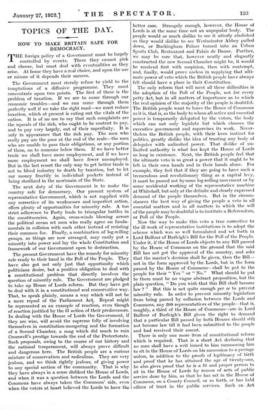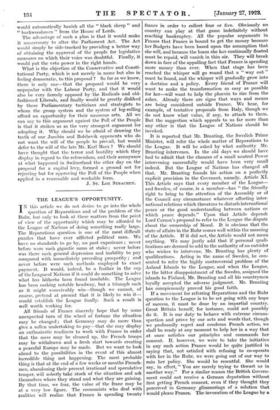TOPICS OF THE DAY.
HOW TO MAKE BRITAIN SAFE FOR DEMOCRACY. THE foreign policy of a Government must be largely controlled by events. There they cannot pick and choose, but must deal with eventualities as they arise. At home they have a real choice, and upon the use or misuse of it depends their success.
The Government must sternly refuse to yield to the temptations of a diffusive programme. They must concentrate upon two points. The first of these is the problem of taxation. If we are to come through our economic troubles—and we can come through them perfectly well if we take the right road—we must reduce taxation, which at present is eating out the vitals of the nation. It is of no use to say that such complaints are the squeals of the rich, who ought to be content to pay, and to pay very largely, out of their superfluity. It is only in appearance that the rich pay. The men who really pay are the poor at the end of the scale—the men who are unable to pass their obligations, or any portion of them, on to someone below them. If we have better trade we shall have more employment, and if we have more employment we shall have fewer unemployed. But in the last resort the only way to get better trade is not to bleed industry to death by taxation, but to let our money fructify in individual pockets instead of being sterilized in the mort main of the State.
The next duty of the Government is to make the country safe for democracy. Our present system of representative Government, which is not supplied with any corrective of its weaknesses and imperfect action, offers plenty of opportunities for minority rule. A too strict adherence to Party leads to triangular battles in the constituencies. Again, cross-winds blowing across the political ocean set men who really agree on funda- mentals in collision with each other instead of resisting their common foe. Finally, a combination of log-rolling groups, as things are now arranged, may easily put a minority into power and lay the whole Constitution and framework of our Government open to destruction.
The present Government have the remedy for minority rule ready to their hand in the Poll of the People. They have also got not only just that opportunity which politicians desire, but a positive obligation to deal with a constitutional problem that directly involves the question of minority rule. The Government are pledged to take up House of Lords reform. But they have got to deal with it in a constitutional and conservative way. That, to speak plainly, means a way which will not be a mere repeal of the Parliament Act Repeal might be represented as an example of reaction, even though of reaction justified by the ill action of their predecessors.
In dealing with the House of Lords the Government, if they are wise, will avoid the supreme folly of involving themselves in constitution-mongering and the formation of a Second Chamber, a snag which did much to ruin Cromwell's prestige towards the end of the Protectorate. Such proposals, owing to the course of our history and the national temperament, will always prove difficult and dangerous here. The British people are a curious mixture of conservatism and radicalism. They are very jealous, and we think rightly jealous, of giving power to any special section of the community. That is why they have always in a sense disliked the House of Lords, and when it was a question between the Lords and the Commons have always taken the Commons' side, even when the voters at heart believed the Lords to have the better case. Strangely enough, however, the House of Lords is at the same time not an unpopular body. The people would as much dislike to see it utterly abolished as they would dislike to sec Westminster Abbey pulled down, or Buckingham Palace turned into an Urban Sports Club, Restaurant and Palais de Danse. Further, we may be sure that, however neatly and elegantly constructed the new Second Chamber might be, it would be received first with suspicion, then with contempt, and, finally, would prove useless in supplying that ulti- mate power of veto which the British people have always felt should have a place in their Constitution.
The only reform that will meet all these difficulties is the adoption of the Poll of the People, not for every petty Act, but in all matters of importance as to which the real opinion of the majority of the people is doubtful. The British people want to leave the House of Commons as it is, that is, as the body to whom all active and essential power is temporarily delegated by the voters, the body which can not only legislate but which chooses the executive government and supervises its work. Never- theless the British people, with their keen instinct for politics, greatly dislike the idea of trusting any body of delegates with unlimited power. That dislike of un- limited authority is what has kept the House of Lords so long in existence. Next, the British people feel that the ultimate veto is so great a power that it ought to be left in their own hands and in their hands alone. For example, they feel that if they are going to have such a tremendous and revolutionary thing as a capital levy, it must be passed not by some log-rolling movement or by some accidental working of the representative machine at Whitehall, but only at the definite and clearly expressed demand of the people themselves. But in the circum- stances the best way of giving the people a veto in all essential matters and in all matters in which the will of the people may be doubtful is to institute a Referendum, or Poll of the People.
Now the way to make this veto a true corrective to the ill work of representative institutions is to adopt the scheme which was so well formulated and set forth in Lord Balfour of Burleigh's Bill for the Poll of the People. Under it, if the House of Lords objects to any Bill passed by the House of Commons on the ground that the said Bill has not got the approval of the country, and asks that the master's decision shall be given, then the Bill— not in the form approved by the Lords, but in the form passed by the House of Commons—shall be put to the people for their " Yes " or " No." What should be put to them must be no vague abstract proposition, but the plain question, " Do you wish that this Bill shall become law ? " But this is not quite enough per se to prevent minority rule. In order to prevent minority legislation from being passed by collusion between the Lords and Commons, any 200 representatives of the people—that is, roughly, a third of the House of Commons—are in Lord Balfour of Burleigh's Bill given the right to demand that a particular Bill passed by both Houses should still not become law till it had been submitted to the people and had received their assent.
There is only one more item of constitutional .reform which is required. That is a short Act declaring that no man shall have a writ issued to him summoning him to sit in the House of Lords on his succession to a peerage unless, in addition to the proofs of legitimacy of birth and proof that he has attained the age of twenty-one, he also gives proof that he is a fit and proper person to sit in the House of Lords by reason of acts of public service done by him, as that he has sat in the House of Commons, on a County Council, or so forth, or has held offices of trust in the public services. Such an Act would automatically banish all the " black sheep " and " backwoodsmen " from the House of Lords.
The advantage of such a plan is that it would make it unnecessary to alter the Parliament Act. The Act would simply be side-tracked by providing a better way of obtaining the approval of the people for legislative measures on which their voice was doubtful. Finally, it would put the veto power in the right hands.
What is the objection of the Conservative and Consti- tutional Party, which is not merely in name but also in feeling democratic, to this proposal ? So far as we know, there is only one—that the proposal would be very unpopular with the Labour Party, and that it would also be very fiercely opposed by the Radicals and old- fashioned Liberals, and finally would be greatly disliked by those Parliamentary tacticians and strategists to whom the group system and the system of log-rolling afford an opportunity for their nauseous arts. All we can say to this argument against the Poll of the People is that it strikes us as the very strongest argument for adopting it. Why should we be afraid of drawing the teeth of our Jacobin and Bolshevik opponents who do not want the will of the people to prevail, but would defer to the will of the late Mr. Karl Marx ? We should have thought that the terror and hostility which they display in regard to the referendum, and their annoyance at what happened in Switzerland the other day on the proposal for a capital levy, formed a ground not for rejecting but for approving the Poll of the People when applied in a reasonable and workable form.
J. ST. LOE STRACHEY.











































 Previous page
Previous page